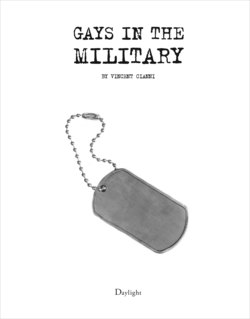Читать книгу Gays In The Military - Vincent Cianni - Страница 17
На сайте Литреса книга снята с продажи.
ОглавлениеMIKE ALMY, WASHINGTON, D.C., 2010
MAJOR, U.S. AIR FORCE, 1993–2006
Air Control Systems Manager. Deployed to the Middle East four times; discharged under Don’t Ask, Don’t Tell; pursuing reinstatement
In my early thirties, I was trying to fully understand who I was as well as the implications of Don’t Ask, Don’t Tell. I had been in the military ten-plus years. I had every intention of staying twenty years to retirement and make a full career out of it. I realized it was a sacrifice I would have to make, keeping my private life separate from my professional life and in all likelihood never having a significant relationship.
When I was in Iraq, the Air Force restricted all private email accounts; we had to use government email on the government network. We used that primarily for work purposes but also for personal use. I used my email writing to family and friends. My unit rotated out of Iraq and the new unit came in and someone, somehow, stumbled upon my private emails. Instead of just deleting them, [he] proceeded to read them, found a couple emails that peeked his interest and raised them up to his squadron commander. They ordered a search of my emails—over 500—and pulled out maybe a dozen or so that were damaging to myself as far as DADT. So in the middle of the Iraq War, during the height of the insurgency, they were searching private emails to see if someone’s violated DADT. They conducted the search without ever getting a lawyer involved. They forwarded those to my commander back in Germany.
About six weeks after we had been back in Germany, my commander called me into his office and the first thing he does is read me the duty policy on homosexuality. I’m sure I must have turned ghost-white because I had no idea that any of this was occurring or had taken place. Then he hands me the stack of emails. I look at them and I recognize them as ones that I had written. But in the back of my mind I’m thinking, “How the heck did you get ahold of these?”
He asked me to explain the emails. I said, “I’m not going to make a statement until I talk to a lawyer first.” We went around and around for about twenty minutes and he realized that he wasn’t going to get anything out of me. He relieved me of my duties right there on the spot. It had a horrible disruption to the unit. A few months later they suspended my security clearance, took away part of my pay, and the whole thing dragged on for about sixteen months before I was finally thrown out of the military. On my last day I was actually given a police escort off the base like I was a common criminal or a threat to security.
Initially I was suicidal because I was devastated. I couldn’t compose myself; I didn’t want to get out of the house, I just wanted the entire thing to go away. That lasted for probably a month or so, and it was really only through a few very close friends that really gave me strength because I had none of my own at that point. They’re the ones that pulled me out of that initial phase. I’m sure I was depressed for two or three years afterwards.
I knew the rules as far as DADT. I never told. The Air Force in essence asked by searching private emails. I refused to answer the question. And yet I was still thrown out. I maintain to this day that the Air Force violated DADT by searching the emails. And yet no one else was held accountable for that. No one else was punished.
I didn’t realize it at the time, but looking back on it, I realize you can never be fully honest or open with people that were close to you, with people that loved you or people that you worked with every day. There is this constant barrier around your private life. It takes its toll after a while. You become so compartmentalized and so internalized that you don’t even realize it.
PAGE 53
